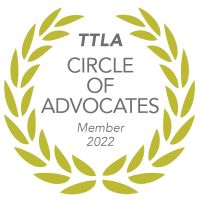1. Photographs
Take photographs of the vehicles, including photos of the final resting place of the vehicles if you can. We understand that you won’t always be able to do this. The injuries are often substantial, and clients are taken from the scene by ambulance, which makes it impossible to photograph the scene. You could ask a friend or relative to take photos of your vehicle if it is towed to a yard for storage. You should also have someone take photographs of your injuries, if they are visible. Bruising goes away. Cuts and scrapes heal.
The gravity of being in a hospital bed can be difficult for a judge or jury to recreate in their mind. It can be very helpful to have that documented by photographs. Be aware, however, that any photographs you take may be discoverable at a later time by Defense counsel. If you are asked in a deposition if you had any visible injuries and you report, “yes, I had bruising and a cut on my upper lip,” the first follow up question will be: “Well, do you have any pictures to prove that?” It’s just how defense attorneys work. Keep in mind that if you are trying to document bruising, you need to be aware of the lighting. Shades of brown and green are often difficult to see without proper lighting.
2. Police Crash Reports and Witnesses
If you have been taken from the scene of a crash to the hospital, you may not have an opportunity to tell your side of the story (how the crash happened) to the investigating officer. In that event, it can be helpful to have a friend or family member request the name and contact number of the investigating officer.
They should ask the officer to come to the hospital to speak with you about what you remember (when you are able). They should respectfully request that the investigating officer wait to file his or her report until they have had a chance to speak with you.
While we all would hope that someone who is responsible for a crash would tell the truth to the officer, it far too often happens that they do not and try to place the blame on you. Also, if there are any witnesses at the scene, it can be very helpful to have their statements. You may request the officer take their statements or at least obtain their names and contact information.
If the officer won’t do it, and there is a way to identify someone at the scene who saw the event, have a friend or family member take down their name and number. This can be critically important, particularly in red light cases, where both parties claim they had the green light.
3. Social Media
What do you do with the photos? Well, it’s probably not safe just to keep them in your phone. Phones can get dropped into lakes or oceans or bathtubs. They can get lost.You need to back the photos up onto a separate device, such as a computer or external hard drive.
Our firm does not encourage posting photos of yourself on Facebook or other social media platforms. It doesn’t help your case and probably hurts it. In that same vein, we generally recommend avoiding posting anything about your crash or your injuries on social media.
It is an area that a defense lawyer will want to investigate, which means that your social media account could be opened and reviewed for any and all information that might relate to the crash, any injuries you received, and/or any activities you engaged in following the crash, any posts you make about how happy or sad you are, etc.
4. Medical Care
Don’t forget to see a physician about your injuries without delay. Even if you are the type of person that avoids doctors and hospitals at all costs, it’s very important that whatever injuries you are experiencing are seen by a doctor and documented. First, you may not be aware of how serious your injuries are, and you need to have that evaluated by a professional.
Second, your medical records serve to document how you were feeling at a given time, what symptoms you were having and when. If you tell a defense lawyer that your neck pain started immediately after the crash, but you didn’t see a doctor until a month later, that’s going to be used against you.
The takeaway: you need to seek medical care to ensure you get the care you need, understand the treatment options that might be available, and to get a care plan set up for you to follow.
You also need to have your injuries documented in the records to make it more difficult for a defense attorney to argue that your injuries are unrelated to the crash.
During the healing process, you may want to keep a journal to remind yourself how you were feeling and what was going on at a given point in time. Litigation can sometimes take a while.It may be difficult to recall how you were feeling at a given point months before.
You may also pass along to any colleague at work or friends/neighbors how you are feeling and how your injuries affect your ability to do work or things you otherwise would normally do. Any observations they have of you in your injured condition could possibly be important later.
5. Chiropractic Care
There is nothing wrong with chiropractic care. For many clients, it gives them greater relief than traditional medicine. We recommend getting a primary care doctor or specialist to recommend that you pursue chiropractic, and preferably document that in their medical record.
The reason for this is that insurance companies and defense attorneys like to portray chiropractic care as inferior medicine. They like to suggest that you sought chiropractic care to run up the medical bills, or that the chiropractor set up a plan that was far to lengthy for your needs, racking up unnecessary bills.
And, to be honest, there have been instances where the chiropractor has probably charged too much, but that is exceedingly rare. So, the takeaway is this: chiropractic care can be a great conservative form of therapy for clients that are having neck, low back, mid back, sometimes shoulder and hip pain. Try to get a referral from your medical doctor before starting chiro care. And be careful that the treatment plan that is set up for you is not unreasonable.
Typically, after 3-4 months of chiropractic care, you should probably return to the PCP and advise how you are doing. He or she can then decide whether continuing the care is in your best interest.
The Haynes Firm provides a free consultation and does not charge a fee for services unless we recover compensation for you. The more serious the injuries involved, the more important it is that you quickly contact an attorney with experience in this area of law. Valuable evidence can be lost if you delay speaking with an attorney, particularly in cases of serious injury.






